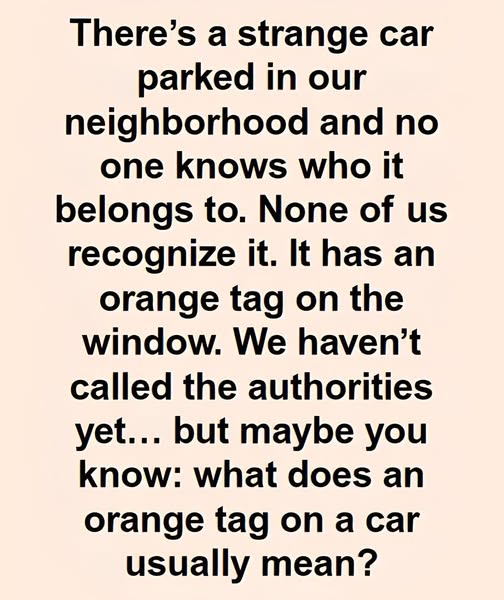Understanding Orange Vehicle Tags: Implications and Actions to Take
Encountering a bright orange tag affixed to your vehicle can be a startling experience. These tags are not decorative; they serve as official warnings from local authorities regarding potential violations related to your vehicle. Such notifications indicate that your vehicle may be categorized as abandoned, inoperable, or a hazard to public safety, necessitating immediate attention from the owner. Ignoring these tags can lead to serious consequences, including towing, impoundment, or even scrapping of the vehicle. Understanding the underlying reasons and the necessary actions can help you navigate this stressful situation effectively.
Who Issues Orange Tags?
Orange tags are primarily issued by various local governmental entities, including but not limited to city parking enforcement, police departments, and code compliance offices. Their purpose is to alert vehicle owners that their cars have been identified as violating certain municipal ordinances or state regulations. While receiving a tag does not automatically result in a fine, it typically represents the inception of a legal process that could culminate in severe outcomes if not addressed. For instance, some cities may have specific departments dedicated to handling abandoned vehicles, which are responsible for issuing these tags after thorough investigations regarding the vehicle’s status.
Reasons for Receiving an Orange Tag
There are myriad reasons why your vehicle might find itself tagged with an orange notice:
- Apparent Abandonment: If your vehicle remains stationary in a public area for an extended period, particularly if it shows no signs of recent use, it may be deemed abandoned. Authorities are likely to tag it if it hasn’t been moved in days. For instance, a car parked in a shopping mall’s lot for weeks without movement might raise alarms.
- Visible Disrepair: Vehicles that exhibit substantial physical damage, such as missing wheels, shattered windows, or flat tires, can be classified as inoperable or abandoned. A vehicle with a significant dent and no signs of movement often becomes an eyesore in neighborhoods.
- Safety Concerns: Vehicles parked inappropriately, such as in front of driveways, fire hydrants, or hazardous areas, are typically subjected to tagging. A car blocking emergency access points can have severe implications during emergencies.
- Expired Registration or Plates: Some municipalities also target vehicles with outdated registration tags or those lacking visible license plates. For example, a car with a registration that expired over six months ago is often flagged to prevent misuse.
Understanding the Tagging Timeline
The timeline for tagging a vehicle varies across different states and local jurisdictions. In certain locations, authorities may issue an orange tag after just 72 hours of inactivity, whereas in others, it may take five to seven days. Once a tag has been affixed, it typically includes a countdown—a deadline by which the issue must be rectified, often ranging from 24 to 72 hours. Failure to comply within this timeframe may result in towing. For example, if your vehicle is tagged on a Monday with a 48-hour period, it’s crucial to resolve the issue by Wednesday morning to avoid towing. This sense of urgency can often dictate how quickly you’ll need to act.
What to Do if Your Vehicle is Tagged
Finding an orange tag on your vehicle can be alarming, but it’s crucial to remain calm and address the situation promptly. Here are actionable steps to follow:
- Read the Tag Carefully: The tag will contain essential details, including the reason for the warning, a contact number, and a deadline for compliance. Understanding the specifics of the tag is vital for determining your next steps.
- Contact Local Authorities: Do not delay. Reach out to the agency responsible for issuing the tag. Inquire about the reasons for the tag and the necessary steps required to resolve the issue. This conversation can be pivotal in clarifying how to proceed.
- Resolve the Issue Promptly: If the issue pertains to mechanical problems, attempt to repair your vehicle or relocate it to a safe, private area. If it’s parked illegally, move it to a compliant location. In cases of expired registration, ensure to update your paperwork quickly before the deadline.
- Dispute If Necessary: If you believe the tagging was unjustified—perhaps your vehicle is operable and properly parked—you can inquire about the appeals process. Collect evidence such as photographs, witness statements, or registration papers to support your case.
The Consequences of Ignoring an Orange Tag
Ignoring an orange tag can result in severe and costly ramifications. If the vehicle is ultimately towed, the owner may incur significant fees, including towing costs, impound fees, and daily storage charges, which can be exorbitant in many cities—sometimes exceeding $50 per day. If the vehicle remains unclaimed beyond a certain period, it may face auction or destruction, further compounding the loss. Not only might you lose your vehicle, but the financial burdens can lead to additional stress and complications.
The Purpose of Orange Tags
Orange tags serve a significant purpose beyond mere bureaucracy. They are instrumental in maintaining safety, accessibility, and order in public spaces. Abandoned or inoperable vehicles can attract vandalism, create hazards, and diminish the overall appeal of neighborhoods. Thus, local authorities utilize orange tagging as a proactive measure to mitigate these issues. The presence of such tags often encourages community members to report vehicles that may violate local ordinances, promoting a culture of accountability.
How to Prevent Receiving an Orange Tag
To avoid the unpleasant surprise of finding an orange tag on your vehicle, consider implementing the following proactive measures:
- Avoid Long-Term Street Parking: If possible, refrain from leaving your vehicle parked in public spaces for extended periods. Utilizing a private driveway is a safer alternative. This practice not only protects your vehicle from potential tagging but also helps maintain neighborhood cleanliness.
- Maintain Your Vehicle: Regular maintenance is crucial. Ensure your vehicle is in good working condition to prevent it from being flagged for visible disrepair. Simple tasks like routine oil changes and tire checks can significantly impact your vehicle’s status.
- Keep Your Registration Current: Regularly check that your registration and plates are valid and easily visible. Setting calendar reminders for registration renewals can save you from this common pitfall.
- Set Reminders: In cities with strict parking regulations, consider setting reminders to move your vehicle periodically to avoid potential issues. A simple phone alert can help keep you compliant with local laws.
In conclusion, while an orange tag is a warning rather than a final judgment, it does necessitate immediate action. Understanding its implications, reaching out to authorities, and taking steps to rectify the situation can help avoid the distressing outcomes associated with vehicle towing or impoundment. By remaining informed about local parking laws and ensuring your vehicle is compliant, you can effectively steer clear of the complications that come with an orange tag. Engaging with local community resources or forums can also provide valuable insights and tips to further navigate vehicle ownership responsibly.

















